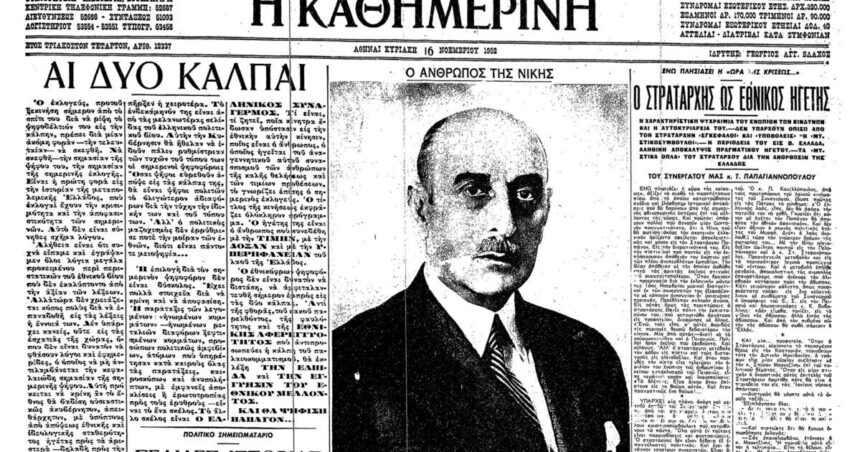On August 6, 1951, Alexandros Papagos announced the founding of his party, Hellenic Alert (ES). Papago’s descent into politics came into public discussion almost simultaneously with the end of the Civil War in 1949. Such was the prestige of the marshal that a large part of society supported the idea of his involvement in politics as the leader of a new party. Papagos also had the support of a large part of the officer corps of the Greek armed forces. The People’s Unionist Party of Stefanos Stephanopoulos and Panagiotis Kanellopoulos and the Neon Party of Spyros Markezini immediately joined the ES. Among those who joined ES included Konstantinos Karamanlis and Georgios Rallis, who until then belonged to the People’s Unionist Party. Politicians from other smaller parties also joined ES.
In the elections of September 1951, the ES became the first party, gathering a percentage of the order of 36.5% and electing 114 deputies. He failed, however, to form a government, mainly because he could not appeal to the voters of the Center, who still largely saw Papago as one of the people of the interwar anti-Venezuelan faction. The opening made by Papagos towards the centrist space also brought liberal politicians, such as Emmanuel Tsouderos, to join the ES.
On October 10, 1952, the Plastira government announced the holding of elections for November 16. From the moment of their announcement, the elections assumed the character of a head-on confrontation between the two dominant formations, the ES and the Union of Parties of the National Progressive Union of Center and Liberals (EPEK-KF), headed by Nikolaos Plastiras and Sofocles Venizelos. The fact that the two factions were led by figures of the interwar Schism, Papagos and Plastiras, gave the feeling of an anachronistic confrontation. The election campaign was particularly tough.
The result of the election left no room for doubt. The ES emerged as the first party, which gathered a percentage of 49.22% occupying 247 seats out of a total of 300. The EPEK-KF Union occupied 51 seats in the new Parliament, while the remaining 2 seats were occupied by centrist candidates, who then joined the two parties of the Center. ES managed to gather such a large percentage that it mobilized the electoral base of the Right, which appeared in the elections represented by a single party. At the same time, the ES managed to expand its influence in the area of the Center, something it had not done in the previous elections.
The sweeping victory of Papagos in the elections of November 16, 1952 was the main topic of “Kathimerini” on the front page of the following day. “The Greek people voted yesterday, overwhelmingly, for the Hellenic Alarm. He voted for the Marshal, who promised him recovery, a new life. He did not deny the expectations that his friends supported him, he did not get carried away by the humblest, most inappropriate demagoguery that ever appeared in a political struggle in Greece. […] And from tomorrow, under the direction of health and with a firm hand, the construction work begins. All Greeks will support it. Even they, whose thought was clouded in the dust of passion, and cast their vote in favor of the opponents. Because the work undertaken does not concern only one portion – no matter how large – of the nation. It’s about the whole. No party prevailed yesterday. A national will and faith in tomorrow prevailed. […] The elections of November 16 already raise the imposing milestone of change in the political history of the country”.
Column editor: Myrto Katsigera, Vassilis Minakakis, Antigoni-Despina Poimenidou, Athanasios Syroplakis









